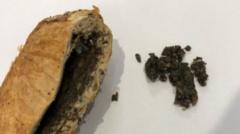The jury has retired to deliberate the fate of Erin Patterson, a 50-year-old woman accused of murdering her family members with a toxic mushroom-laden lunch in July 2023. The trial, marked by emotional testimonies and contentious evidence, concluded with closing arguments from both the prosecution and defense.
Jury Begins Deliberations in Erin Patterson's Toxic Mushroom Trial

Jury Begins Deliberations in Erin Patterson's Toxic Mushroom Trial
Court rules require jurors to consider evidence and emotions in high-profile case
The jury in the trial of Erin Patterson, who faces multiple charges including murder and attempted murder, has retired to deliberate following nearly two months of testimonies and over 50 witnesses. Patterson has pleaded not guilty, asserting that the toxic death cap mushrooms allegedly used in the beef Wellington lunch served at her home in regional Victoria were included accidentally. The prosecution maintains that Patterson deliberately poisoned her guests, including her in-laws, who subsequently succumbed to illness.
In the courtroom, prosecutor Nanette Rogers SC painted Patterson as a liar who manipulated circumstances, claiming she misled relatives into attending the gathering under false pretenses about a cancer diagnosis. The alleged motive for her actions, according to the prosecution, hinges on a struggle for attention and sympathy, culminating in a desperate act. Conversely, Patterson's defense argued the lack of clear motive and highlighted her close relationships with the victims, asserting that the mushrooms in question could have been mixed up with non-toxic varieties from her pantry.
Patterson herself testified, revealing her history with bulimia and a fear of judgment over her plans for weight-loss surgery, which may have influenced her decisions leading up to the fateful meal. The defense lawyer urged jurors to consider the full context of Patterson’s actions rather than judging her based solely on inconsistencies in her statements.
As the jury reads the situation, presiding judge Christopher Beale emphasized the importance of objective facts over emotional responses, reminding jurors of their substantial responsibility to deliver a verdict that aligns with evidence, rather than sentiments.
The jury is now sequestered, meaning they will stay in isolation as they deliberate, ensuring their decision is free from outside influence until they reach a consensus.
In the courtroom, prosecutor Nanette Rogers SC painted Patterson as a liar who manipulated circumstances, claiming she misled relatives into attending the gathering under false pretenses about a cancer diagnosis. The alleged motive for her actions, according to the prosecution, hinges on a struggle for attention and sympathy, culminating in a desperate act. Conversely, Patterson's defense argued the lack of clear motive and highlighted her close relationships with the victims, asserting that the mushrooms in question could have been mixed up with non-toxic varieties from her pantry.
Patterson herself testified, revealing her history with bulimia and a fear of judgment over her plans for weight-loss surgery, which may have influenced her decisions leading up to the fateful meal. The defense lawyer urged jurors to consider the full context of Patterson’s actions rather than judging her based solely on inconsistencies in her statements.
As the jury reads the situation, presiding judge Christopher Beale emphasized the importance of objective facts over emotional responses, reminding jurors of their substantial responsibility to deliver a verdict that aligns with evidence, rather than sentiments.
The jury is now sequestered, meaning they will stay in isolation as they deliberate, ensuring their decision is free from outside influence until they reach a consensus.

















